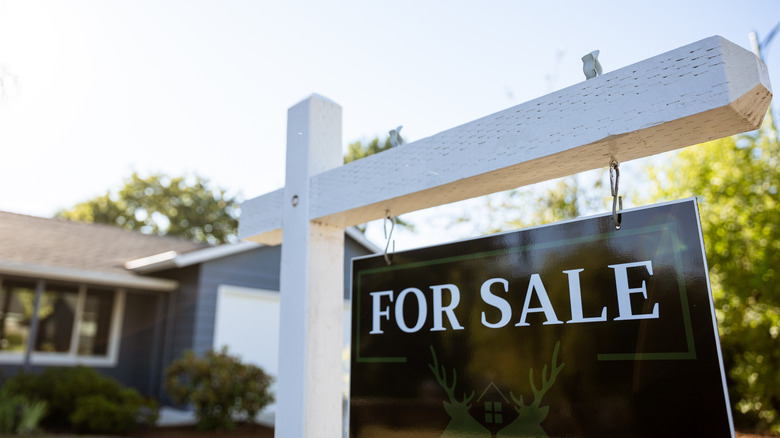9 Reasons Retirees Regret Moving To A Retirement Community
Data from the American Health Care Association shows there are some 1.1 million Americans living in retirement or assisted living communities across the United States, a notable but unsurprising number. The U.S. population is rapidly aging. Per the 2020 Census, one out of every six Americans was 65 or older. With so many citizens of retirement age, the demand for spaces and communities tailored to their needs will naturally increase over time.
For millions of Americans who are at or nearing retirement age, they may be strongly considering a change in their living situation. For some, they might find themselves living with children or grandchildren, while others take the daring leap and move abroad.
For older retirees who set their sights on retirement communities, it can be a move that leads to a more relaxed lifestyle, surrounded by like-minded seniors, where things should go exactly as planned. Unfortunately, this isn't always the case, and some retirees find, in time, if not immediately, that they regret moving to a retirement community. The reasons for their remorse can vary. Below are some common reasons retirees may see the move as a big mistake.
The potential for high monthly expenses
One of the most immediate regrets following moving into a retirement community might be how much it costs to make it happen. Some communities charge residents entry fees that begin as low as $40,000, according to the AARP, while some community fees exceed $2 million. In some cases, it might be possible to offset these fees through long-term care insurance. However, more often, these fees must be paid out of pocket. Beyond the initial move-in fees, month-to-month expenses might be far higher than expected.
The cost of living in retirement communities starts at $1,500 per month, but can reach and even exceed $12,000 per month. Meanwhile, SmartAsset and AARP the median monthly retirement income is reportedly $3,900 for individuals and $8,300 for couples. Income limitations could put many communities out of the price range of the retirees who wish to move there. However, some older Americans may find that while they have just enough to get into a community, entry fees combined with ongoing expenses severely impacts their ability to live comfortably. This also doesn't factor in the cost of medical necessities such as in-home care, transportation to and from doctor appointments, and prescription refills.
While some seniors have savings and annual passive income that let them easily navigate the challenges of relocating to a retirement community, this isn't true for everyone. Without proper planning and resource management, it wouldn't be surprising if some retirees soon regret their decision to move into their new communities.
You could lose touch with friends and family
By the time someone reaches their golden years, the friendships and connections made over their lifetime are very important and not to be taken for granted. Whether it's weekends with the grandchildren or game nights with your fellow retirees, these are relationships that you've built that you could see severely impacted upon moving into a retirement community.
In sharing drawbacks for an article called "Top 10 Reasons NOT To Move Into A 55+ Community," a blogger admitted that one primary reason they would hesitate is that they'd already established deep roots in their current neighborhood. The person admitted it would be tough to go from a place where everyone knows you, people routinely exchange recipes, and there's so much camaraderie during hard times, to a brand-new living situation—one where old neighbors might not be inspired to keep in touch. It can be hard to go from a routine of constant interactions and phone calls to weeks without hearing from anyone. I
f you're lucky, you might be able to spend time with these friends and family members around the holidays. Otherwise, it's a hard reset that forces you to build new friendships and connections from the ground up, at a time in your life when you may not have the easiest time forging brand-new connections. The harsh reality of losing touch with loved ones and friendly neighbors can lead not just to regret but also to feelings of grief and sadness, which may be made worse for retirees navigating this move on their own.
Moving to an age-restricted community can harm mental health
This one reason might initially seem counterintuitive. After all, the purpose of many age-restricted communities is to let seniors live and socialize with people of the same age with similar life experiences. There may be an assumption that retirees will all have similar levels of health and engagement, leading them to prefer living among people of the same age group. And while this may be true for many Americans near or at retirement age, it's not always the case.
Retirees who spent years living in communities with more diverse demographics may find relocating to a retirement community quite jarring. From there, you are locked with living near and spending time with people of a specific age range. Before deciding to move, it might be best to visit the community and talk to seniors who already live there. Some communities take care to foster relationships among residents, as loneliness in older citizens is a serious issue that can affect mental and even physical health, as per Psychiatrist.com. Also, research from ScienceDirect suggests that living in a diverse community has a positive impact on seniors, allowing them to form empathetic connections with others and develop a better understanding of life experiences beyond their own.
Getting a sense of the day-to-day life, if there are any local activities, etc., could mentally and emotionally prepare you to relocate to a retirement community. Likewise, the research retirees and their loved ones do beforehand could help them avoid making a move they might later regret in a community that doesn't align with their way of life and social needs.
If you move out, there might be a fee
Just as moving into and settling down in a retirement community has its share of challenges, another one may arise should you decide to move out of your home. In some instances where you signed a lease agreement, early termination may result in an exit fee. According to the Leasehold Advisory Service, exit fees are charges levied by landlords at the point of sale for retirement properties. While many American retirement villages don't charge these fees, they could catch U.S. retirees off guard if they choose to move to Europe, Australia, or New Zealand, where such fees are far more common. They might also be referred to as deferred management fees, which cover the cost of accessing pools, gym equipment, etc.
Adding to the potential confusion, there are some communities that continue to charge rent to your family even after you pass away. A Reddit member from Massachusetts shared their unfortunate and bizarre situation on the r/legaladvice Subreddit. The father had passed away and while cleaning out his residence, the family was informed that they had thirty days to pay $12,000 or hope that the space was occupied by a new renter to avoid the bill. Commenters shared similar horror stories of surprise fees tied to retirement community leases. One leasing manager commented that often leases require a 30-day notice to be released early from termination fees — and that death doesn't count. Regardless of whether you are leasing a retirement property in America or abroad, make sure to know the details of your lease agreement, or how many years you're expected to remain in your new home before any severe financial obligations go away.
You might not have the same benefits as a traditional homeowner
In most circumstances, a retired individual or couple who chooses to move into a retirement community will go through a process similar to a traditional real estate transaction, in which they view the home, agree to purchase it, and take outright ownership of the property. There are fees to be aware of, such as monthly equity fees, homeowners' insurance, and property taxes, but at least you can be confident that the property is yours and that you or your family can sell it later.
This isn't the case for every resident; some may be relocating to leased homes and apartments, where they can live comfortably for the remainder of their lives, but once they pass on, the property's ownership returns to the landlord or the company that actually owns the home. It may be that the new living situation is more affordable. However, for proud homeowners who worked for many years to secure a house, relocating to a community where they lack equity can be pretty jarring. If you don't like the idea of not owning your home, you should, instead, consider paying for a part-time caretaker. Likewise, perhaps stick to equity-based retirement villages that let you own the home instead of lease it.
If you simply cannot find an affordable retirement community where you own the house outright but wish to relocate to an older community, have your family help you do research to find a town where retirees are choosing to move. That way, you can still settle in a retirement-friendly city while maintaining the life of an independent homeowner.
You might not get along with your new neighbors
According to Talker Research, 69% of people surveyed find it very difficult to form close friendships as they age. The researchers polled 2,000 Americans, most of whom admitted to having seen friendships fade in the last decade. While younger respondents admitted they struggled to maintain close connections, it can be difficult for older Americans as well, with the caveat of severe health risks such as obesity, heart disease, and a weakened immune system.
Upon moving into a retirement community, retirees might initially feel elated, only to regret it later when they find they are struggling to make new friends. It could be that both sides lack shared interests. Worse, personality differences could be intense enough to cause irreversible friction. One way to avoid stepping into a toxic living situation is to spend time getting to know the location and the people who live there.
Another situation that might not be as hostile, but could still be unpleasant, is where your quality of life and health is much different than your neighbors. For retirees with mobility issues or poor quality of life, you might not be able to meet and form friendships with neighbors because they're far more active. You may feel left out or isolated, regardless of whether community members intend to do so. It's crucial to find a living situation that fits your current and near-future quality of life, but also to be sure you will be surrounded by people who can understand your circumstances and with whom you won't feel limited. That might mean avoiding a move into certain retirement communities altogether.
You may no longer be able to afford to travel
For retirees who are used to traveling, and having the extra money to do so, this could become challenging after relocating to a retirement community. Whether they use up a good portion of savings on move-in costs or find themselves trying to keep up with monthly living expenses, the funds previously reserved for regular trips to different countries may no longer be there.
Some estimate that the cost to travel internationally can top $2,000 per month or $25,000 per year. Expenses can double when traveling as a couple and continue to grow if part of a group. Overall, it's a lifestyle that can cost considerable money, and one that may move beyond the reach of retirees who shift to a new way of life and standard of living after purchasing their retirement community home.
Though it might not be easy to give up a life of global mobility, for some retired Americans, it might ultimately be necessary due to changes in health or passive income. Even so, it might be hard to avoid a sense of lost freedom and independence, and certainly, feelings of overall regret.
The local climate may make the retirement community a poor fit
It's hardly a secret that Americans of retirement age generally relocate to cities and states with warmer weather. Some may choose to become "snow birds," a nickname for travelers who engage in seasonal travel domestically or abroad to escape the harsh winter weather at home. That's because, as humans age, our bodies no longer cope with cold weather conditions as well as they did when we were younger. Seniors are increasingly vulnerable to hypothermia, and having winter weather-driven cold and flu symptoms transform into something truly life-threatening. Even if they successfully avoid becoming ill, going out in icy conditions can still be dangerous due to the risk of slipping and suffering severe physical harm.
For retirees who settle into homes in warm-climate retirement communities, these cold-weather concerns become a distant memory, and they can enjoy warm or even hot weather for much of the year. But some retired Americans who move into communities in the northeastern or midwestern United States, or other regions known for rough winter weather, will likely struggle to cope with the climate's impact on their bodies and related health risks.
On the opposite end of the weather spectrum, extreme heat can also pose serious problems to seniors, who are more vulnerable to heat strokes than most. When deciding on whether to move into a retirement community, the seasonal climate is definitely something to take into consideration. If it's in a region you're not familiar with, failure to do research might lead to not only weather-related discomfort, but potential health risks.
You could struggle to sell the property
It's important to note that homes located in retirement communities are notoriously tricky to sell. SmartAsset gave a few reasons for this. First, and most notably, is the age restriction. With a traditional home, you're usually able to sell it to a wide range of buyers. However, if your home is in a place where a person must be a certain age to move in, that severely limits the number of people who can make an offer. There's also the potential for competition, where would-be home buyers may choose a newly constructed house over a previously owned one.
Another surprising issue that could arise is if your community strictly forbids placing a "for sale" sign on your lawn. This sort of restriction would no doubt be intensely frustrating, as these signs are among the most obvious ways to attract buyers. Often, if people don't see a sign indicating a home is available, they'll assume it isn't and move on. Lastly, you may have to pay additional fees related to the property sale.
Even if you successfully completed the move into your retirement community and managed to adapt to life there, this final struggle as you attempt to move on to a new chapter of your life may color your entire experience there, causing you to regret having moved into the neighborhood in the first place.









